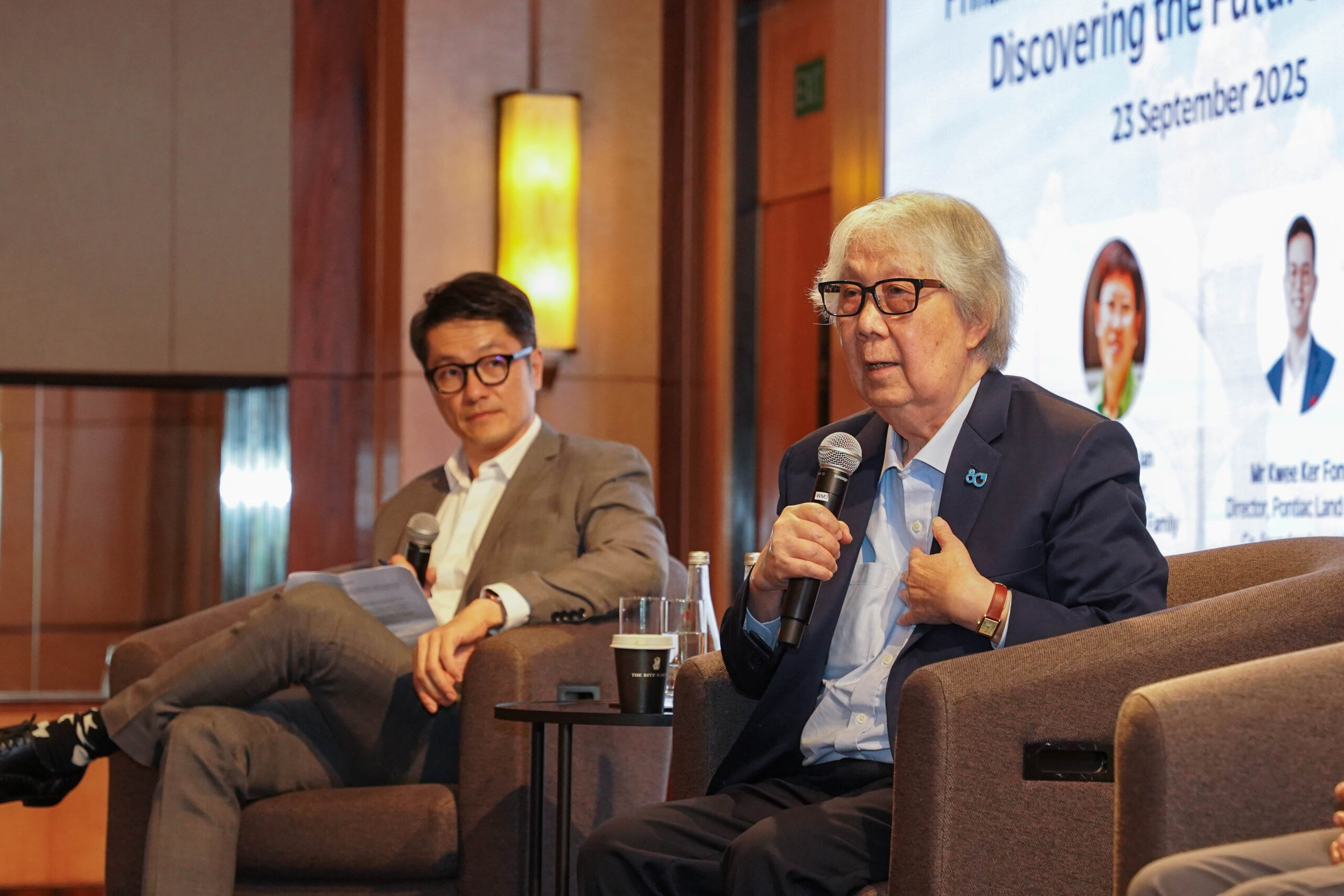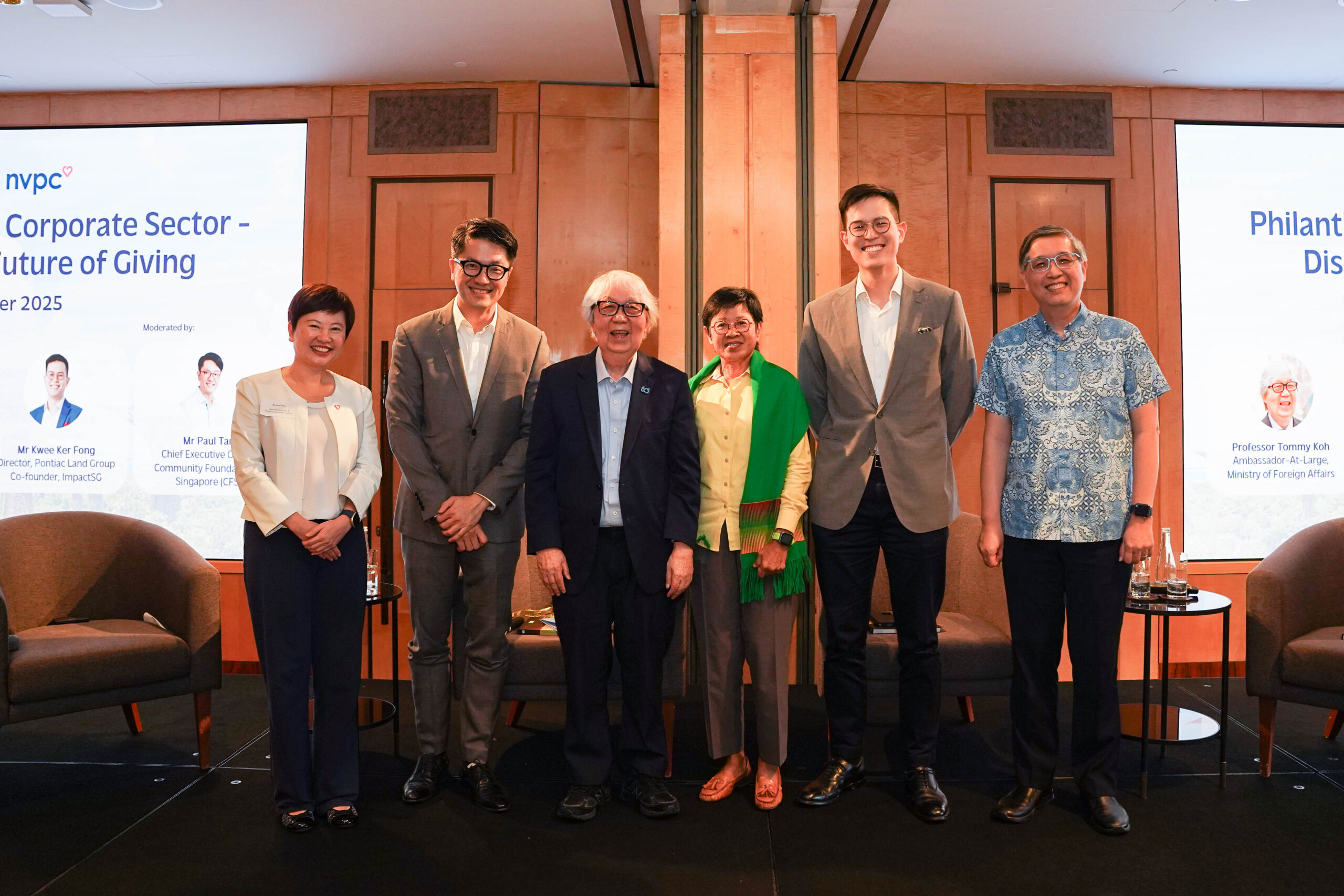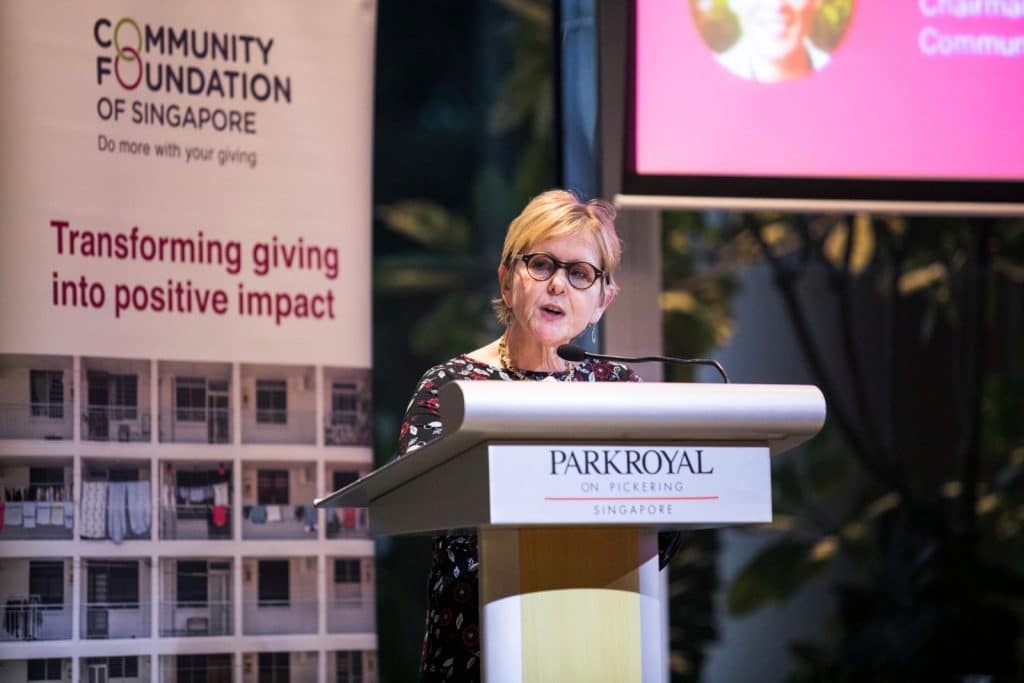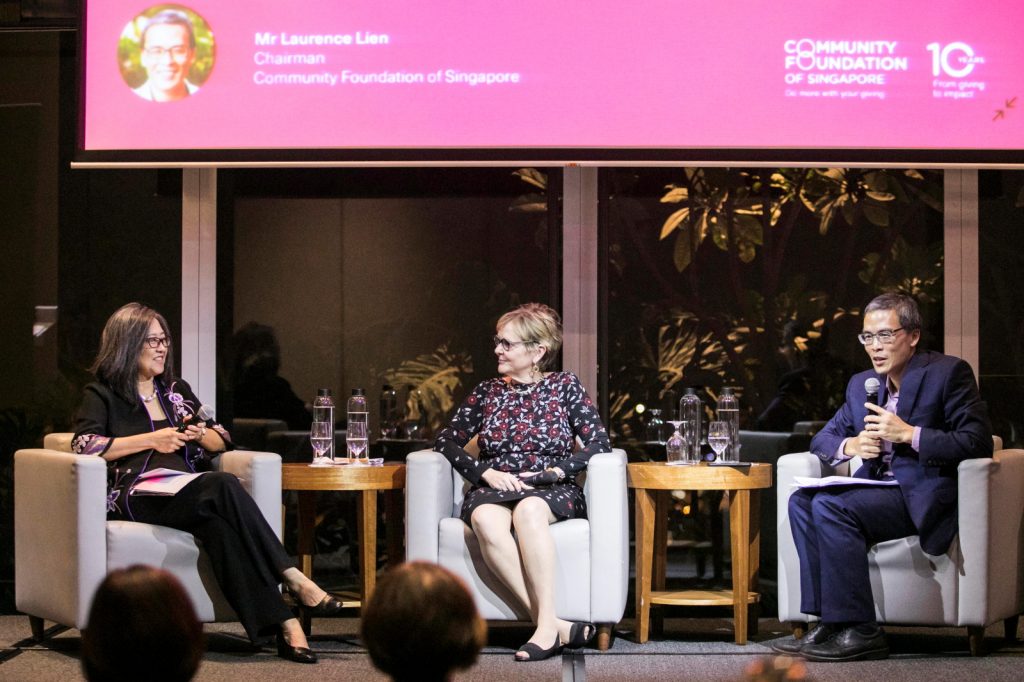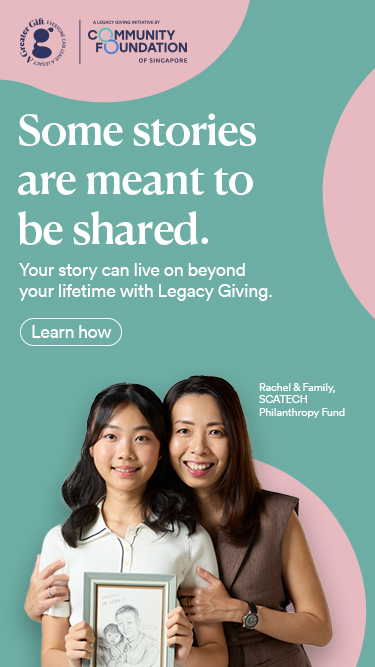CFS Philanthropy Forum 2019: Looking to the future of community philanthropy

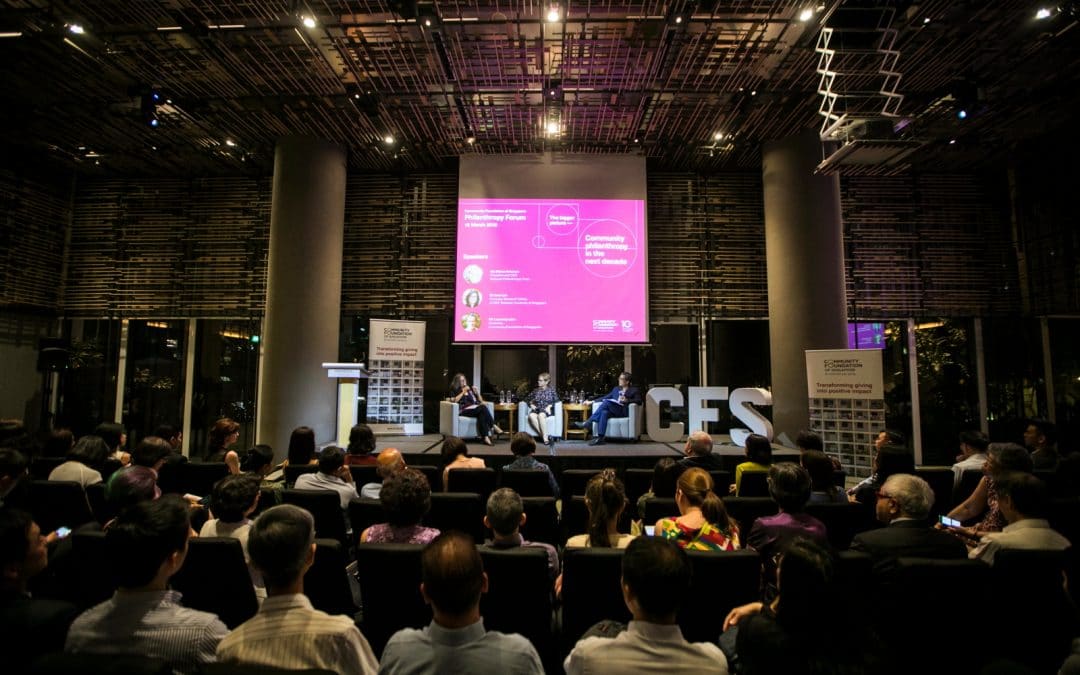
At the CFS Philanthropy Forum 2019 held on 18 March, over 100 guests – including donors, charities and partners – gathered to hear from leaders and experts on what lies ahead for community philanthropy.
Headlining the evening was keynote speaker Eileen Heisman, President and CEO of National Philanthropic Trust (NPT), the largest independent donor advised fund (DAF) administrator in the United States. In her dynamic speech, Eileen – a founding member of CFS’s international advisory committee – shared NPT’s amazing journey to raising more than US$13 billion in charitable contributions, and encouraged all in attendance to rise to the challenge of taking local philanthropy to new heights.
Following her speech, Eileen was joined by Dr June Lee, Honorary Research Fellow, Asia Centre for Social Entrepreneurship & Philanthropy (ACSEP) at the National University of Singapore, and moderator Laurence Lien, Chairman of CFS, in an engaging panel discussion on how DAFs enable smarter, better giving by helping donors give more thought to the purpose of their charitable dollars.
Referring to how DAFs are gaining rising interest in Asia, Eileen commented, “A lot of people have chosen donor advised funds because they want something that’s easy, turnkey, relatively inexpensive and can be adapted to changing interests. Donors have many different types of philanthropic goals, so with a DAF, they can shape the fund according to their preferences and they can change their giving focuses over time.”
June noted DAFs offered specific advantages for families looking to give. “In a recent research paper published by ACSEP, we found that one of the biggest question families ask is ‘how do we engage family members in our giving?’” Setting up a DAF allows a founder to set aside funds for philanthropy without burdening his or her children financially, she adds, while also allowing flexibility down the line when a founder’s children wish to pursue to a different charitable cause from their parents.
Remarking on the opportunities ahead for community philanthropy, Eileen cited the growth of two major trends: micro donor advised funds targeting millennials, and new services enabling direct payroll deductions into donor advised funds. “These trends will change the face of donor advised funds as we go forward,” she said.
She challenged CFS to tap on these wider trends to expand its offerings, “As someone who’s very much invested in CFS’s success, I would like to see CFS be creative and thoughtful about expanding the horizon for donors and the community of Singapore to express their philanthropy in different and new ways.”
In his closing remarks, Laurence commented, “It’s clear DAFs are a trend that can’t be turned back. DAFs are there for us to use, to promote, and the only direction is up.”
The evening ended on a poignant note as CFS announced the handover of its chairmanship from Laurence to Christine Ong who takes over as Chairman on 1 April.
Indeed, CFS has come full circle and we are so grateful for the guidance, trust and support we have received over the last decade.
At the CFS Philanthropy Forum 2019 held on 18 March, over 100 guests – including donors, charities and partners – gathered to hear from leaders and experts on what lies ahead for community philanthropy.
Headlining the evening was keynote speaker Eileen Heisman, President and CEO of National Philanthropic Trust (NPT), the largest independent donor advised fund (DAF) administrator in the United States. In her dynamic speech, Eileen – a founding member of CFS’s international advisory committee – shared NPT’s amazing journey to raising more than US$13 billion in charitable contributions, and encouraged all in attendance to rise to the challenge of taking local philanthropy to new heights.
Following her speech, Eileen was joined by Dr June Lee, Honorary Research Fellow, Asia Centre for Social Entrepreneurship & Philanthropy (ACSEP) at the National University of Singapore, and moderator Laurence Lien, Chairman of CFS, in an engaging panel discussion on how DAFs enable smarter, better giving by helping donors give more thought to the purpose of their charitable dollars.
Referring to how DAFs are gaining rising interest in Asia, Eileen commented, “A lot of people have chosen donor advised funds because they want something that’s easy, turnkey, relatively inexpensive and can be adapted to changing interests. Donors have many different types of philanthropic goals, so with a DAF, they can shape the fund according to their preferences and they can change their giving focuses over time.”
June noted DAFs offered specific advantages for families looking to give. “In a recent research paper published by ACSEP, we found that one of the biggest question families ask is ‘how do we engage family members in our giving?’” Setting up a DAF allows a founder to set aside funds for philanthropy without burdening his or her children financially, she adds, while also allowing flexibility down the line when a founder’s children wish to pursue to a different charitable cause from their parents.
Remarking on the opportunities ahead for community philanthropy, Eileen cited the growth of two major trends: micro donor advised funds targeting millennials, and new services enabling direct payroll deductions into donor advised funds. “These trends will change the face of donor advised funds as we go forward,” she said.
She challenged CFS to tap on these wider trends to expand its offerings, “As someone who’s very much invested in CFS’s success, I would like to see CFS be creative and thoughtful about expanding the horizon for donors and the community of Singapore to express their philanthropy in different and new ways.”
In his closing remarks, Laurence commented, “It’s clear DAFs are a trend that can’t be turned back. DAFs are there for us to use, to promote, and the only direction is up.”
The evening ended on a poignant note as CFS announced the handover of its chairmanship from Laurence to Christine Ong who takes over as Chairman on 1 April.
Indeed, CFS has come full circle and we are so grateful for the guidance, trust and support we have received over the last decade.
- Related Topics For You: DONOR STORIES, DONOR-ADVISED FUND, EVENTS, OPINION
